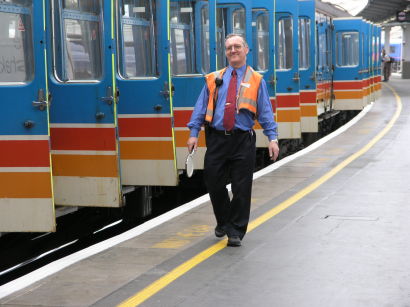A NEW report from the TUC claims that rail privatisation has failed, and has brought in little private sector investment.
'The Great Train Robbery' – written for the TUC by the Centre for Research on Social-Cultural Change at the University of Manchester – says that private train companies are 'heavily dependent upon the public purse' to enable them to run services.
In addition, most profit made by train operators goes to shareholders. The report says that rhe top five recipients alone received almost £3 billion in taxpayer support between 2007 and 2011. This allowed them to make operating profits of £504 million – £466 million of which was paid to shareholders.
Rolling stock investment has fallen back at times, with £1.9 billion spent on rolling stock between 2008 and 2012, compared with £3.2 billion between 1989 and 1993. However, some industry sources suggest this could be misleading, because there was more investment in the earlier years of privatisation, when new fleets were procured for Virgin, TransPennine Express, ScotRail and the three third-rail operators south of London which play a key role in the commuter market. Indeed, the formerly large slam-door electric fleets had been replaced by 2005-6
The report is also luke-warm about the innovations which are often credited to the private sector operators, saying that even where there has been private sector investment in new technology, such as Virgin’s tilting trains, it has been underwritten by the state through subsidies to train operating companies and guarantees to rolling stock leasing companies.
It points out that investment in infrastructure has largely been funded through borrowing by Network Rail, which now has debts of over £30 billion, and that the company is spending more on servicing and repaying this debt than on maintenance. It also says that average train fares in Britain increased by three times the rate of average wages between 2008 and 2012.
TUC General Secretary Frances O’Grady said: “This study explodes the myth that rail firms are bringing added value to our railways. In reality they rely upon taxpayers to turn a profit, virtually all of which ends up in shareholders’ pockets, rather than being used to improve services.
“Rail privatisation has not brought the improvements its cheerleaders promised – the average age of trains has increased and most new investment is funded by the state.
“The claim that private train operators are responsible for more people using the railways must also be taken with a huge pinch of salt. Passenger growth has mirrored changes in the wider economy and is not the result of creative marketing drives by companies.
“The government must accept that the current model is broken. Its determination to impose franchising across the network – even on the East Coast Main Line which is performing well as a nationalised service – shows ministers are ignoring the evidence of 20 years of failure.”
ATOC chief executive Michael Roberts did not agree. He said: "Britain’s railway has been transformed in the last 15 years, thanks to the public and private sectors working successfully together to deliver for passengers and taxpayers. By introducing competition between train companies to run services, government has ensured operators have played a crucial role in reversing the fortunes of the railway by motivating them to attract more passengers.
“Significant investment plus an industry focused on encouraging rail travel are generating record levels of revenue to pay for more trains, faster services and better stations.”
Jeremy Acklam from the Institution of Engineering and Technology added: "When British Rail existed, investment in the track, stations and trains was determined by the Government of the day if they had any money available.
"This report hints that the UK should return to publicly owned railways and therefore it’s clear that the current rate of investment would be then used for other things. Privatisation has enabled large scale investment in engineering through rolling stock, stations and track because long term investors can be certain of their returns over many years. The next five year investment period will see more than £45bn for new track and trains, a figure which would have been unthinkable in the days of British Rail."


